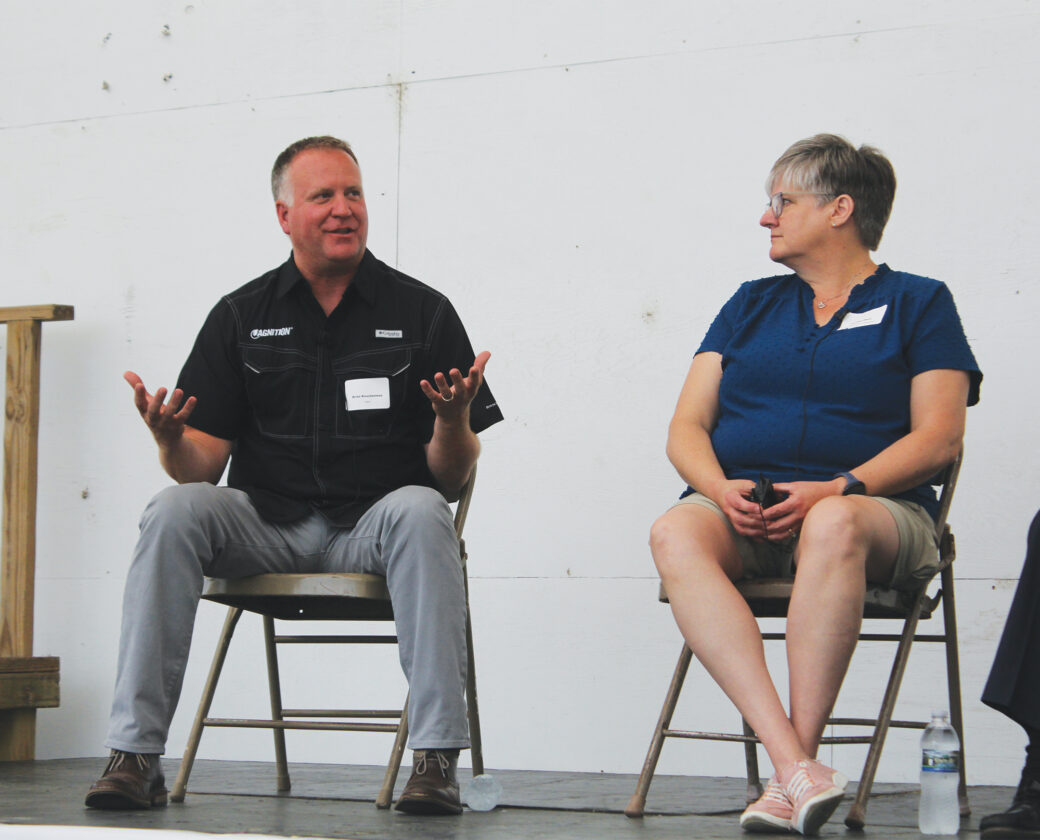State of Ag in SW Minn.: ‘It’s been a crazy last 18 months’

Photo by Deb Gau Ralco Nutrition President and CEO Brian Knochenmus, left, and organic crop farmer Carolyn Olson answer questions during Tuesday’s State of Agriculture panel at the Lyon County fairgrounds.
MARSHALL — There are still a variety of challenges ahead for farmers in southwest Minnesota, area agriculture leaders said Tuesday.
At the fifth annual State of Agriculture panel held at the Lyon County fairgrounds, panelists weighed in on topics ranging from the economy to the future of ag education.
Minnesota state Sen. Gary Dahms said he thought there was a recession coming.
“I think some facets of agriculture are going to get hit pretty hard,” Dahms said.
If consumers make different purchasing decisions to save money, the shift will also affect producers, he said.
Ralco Nutrition President and CEO Brian Knochenmus said that while agriculture isn’t “recession-proof,” there’s also hope in knowing that people will always need food.
“We’ve got an advantage in that regard,” Knochenmus said. However, agriculture businesses will need to be more efficient and deal with changing markets, he said.
Mike Booerboom, CEO of Boerboom Ag Resources near Marshall, said pork producers have weathered past recessions better than other types of livestock producers, but that didn’t mean they wouldn’t also be affected.
Boerboom said there have been plenty of challenges for pork producers in the past couple of years as well.
“It’s been a crazy last 18 months,” Boerboom said.
For a while, it was a struggle trying to find needed hog feed ingredients like lysine.
“The cost of production has also ballooned,” he said.
Other panelists said economic uncertainties created similar challenges for their farms and businesses.
“It creates a lot of fluctuation in our markets. It makes selling our crops harder,” said panelist Carolyn Olson, an organic crop farmer in the area.
Among the challenges facing agriculture businesses are the ways supply and economic uncertainties have affected cash flow, Knochenmus said.
“If you’re not financially healthy, it’s tough to adjust,” he said.
Panelists said also said hiring agricultural workers and maintaining a strong workforce was a challenge, for a variety of reasons.
“In our business, we’re definitely looking for people who are passionate about agriculture,” Boerboom said.
He said it’s harder to find people who want to work on a farm, and work with livestock every day. Both Boerboom and Olson said temporary work visa programs have helped Minnesota agribusinesses hire skilled employees.
Building strong rural communities and infrastructure would also help attract workers to southwest Minnesota, Olson said.
“Affordable housing and affordable child care are two things our (Minnesota Farm Bureau) members keep talking about,” she said.
Panelists also talked about the need to encourage new farmers, and build connections with consumers. Knochenmus said there needed to be more excitement about the agriculture field.
“We’re maybe not telling our story very well,” he said.
Dahms said he also thought Minnesota was still feeling the consequences of cutbacks to agriculture education at the high school level.
In response to an audience member’s question, Dahms shared his positions on energy policy in Minnesota. Dahms said he thought renewable energy sources like solar and wind power were being pushed too fast.
“We are not at a stage where we can get rid of fossil fuels and still have a base load of energy,” he said.
Minnesota needed to slow down and develop the infrastructure to make renewable energy and electric vehicles more reliable, Dahms said.



